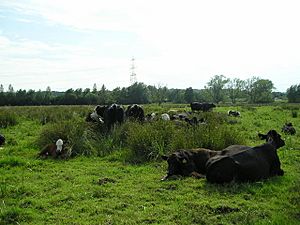Iffley Meadows facts for kids
| Site of Special Scientific Interest | |

Cattle grazing at Iffley Meadows
|
|
| Area of Search | Oxfordshire |
|---|---|
| Interest | Biological |
| Area | 36.1 hectares (89 acres) |
| Notification | 1986 |
| Location map | Magic Map |
Iffley Meadows is a special natural area near Oxford in Oxfordshire, England. It covers about 36.1 hectares, which is like 89 football fields! This beautiful place is a Site of Special Scientific Interest, or SSSI. This means it's officially protected because of its unique plants and wildlife.
The land is owned by Oxford City Council. It is looked after by the Berkshire, Buckinghamshire and Oxfordshire Wildlife Trust. They work hard to keep it a healthy home for nature.
Contents
What Makes Iffley Meadows Special?
Iffley Meadows is a fantastic example of a "flood meadow." This means it's a low-lying field that gets covered by water when the River Thames floods. These floods bring new soil and nutrients, which help many plants grow.
A Home for Unique Plants
The soil here is mostly clay. When the river floods, it leaves behind rich silt. This makes the grassland very fertile. You can find many different kinds of plants here.
The Amazing Snake's Head Fritillary
The most famous plant at Iffley Meadows is the snake's head fritillary. In spring, this meadow becomes a purple carpet! There are about 89,000 of these beautiful flowers. They have a checkerboard pattern on their petals. It's a truly amazing sight to see.
How the Meadows Are Managed
For a long time, these meadows have been managed in a traditional way. Farmers use them for hay and pasture. Hay is grass that is cut and dried to feed animals in winter. Pasture means animals like cows can graze there. This traditional farming helps keep the meadow healthy. It also allows special plants like the snake's head fritillary to thrive.
Old River Channels and Hedges
The site also has old river channels and ditches. These are like small waterways that used to be part of the river. There are also overgrown hedges. These features create different habitats. They provide homes and shelter for many small animals and insects.
Images for kids


